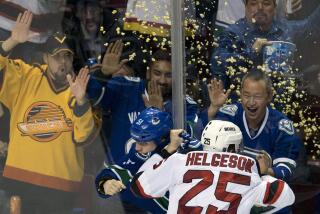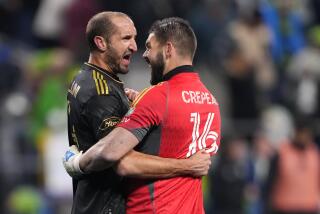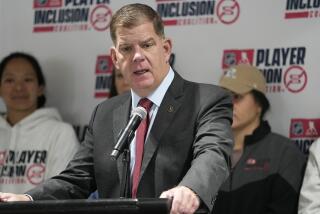Gagne joins list of Flyers with concussions
- Share via
PHILADELPHIA -- Simon Gagne sounded like the Flyers stars knocked into a daze before him.
He complained of dizzy spells, standing up and losing his sense of balance, and waking up every morning and simply not feeling like himself -- a superbly conditioned NHL player.
Gagne believed after some rest he was well enough to play, only to absorb another blow to the head that made his concussion worse, perhaps even gave him a second trauma. With Philadelphia in the thick of the playoff chase a year after it had the worst record in the NHL, Gagne wanted nothing more than to contribute and not let his teammates down.
No matter how disheartening it was for the Flyers to see Gagne, a former All-Star, suffer the lingering effects of a concussion, they’ve lived through the experience before. Although blows to the head are often part of playing professional sports, especially in the NHL with its punishing, high-speed collisions, perhaps no franchise this decade has lost stars to concussions for extended periods like the Philadelphia Flyers.
Gagne is out for the season and not likely to play again until next year, making him the latest in a line of Flyers who had their seasons, sometimes their careers, cut short because of concussions and the post-concussion trauma that could stay with them the rest of their lives.
“I think we’ve been unfortunate more than anything,” Flyers General Manager Paul Holmgren said. “We’ve had what seems to be more than our fair share.”
Jeremy Roenick, who now plays for the San Jose Sharks, considered retirement in 2004 after he was struck by a puck that broke his jaw and gave him a severe concussion.
Former Flyers captain Keith Primeau retired at 34 after a series of concussions, most notably in the 2000 and 2004 playoffs, had even the most mundane skating drills causing him headaches, fuzziness and pressure in his neck.
And there was former MVP Eric Lindros, whose prolific career was derailed by countless concussions, including a vicious check by New Jersey’s Scott Stevens in the 2000 Eastern Conference finals. That hit ended his tumultuous career with the Flyers.
“It’s too bad to say those guys had to go through those kinds of injuries to maybe be an example for us,” Gagne said. “When you see the ending with those players, you think twice before you go back.”
Gagne, who turned 28 this week, had been pretty lucky in his eight-year career. He mostly avoided the hits to the head that would send him to the bench and a trip to the trainer’s room. But when he suffered a concussion in October after his jaw crashed into the shoulder of Panthers defenseman Jay Bouwmeester, it triggered a pattern of symptoms all too familiar to the Flyers.
Gagne sat out four games, then was hurt again Nov. 7 and missed the next 26 games. He was injured again on his first shift in a Feb. 10 loss at Pittsburgh and hasn’t played again.
Gagne was told by a specialist that he didn’t suffer three concussions, but that the first one in October never properly healed and was aggravated with each additional blow. Gagne originally complained of vision problems and dizziness, but was not first diagnosed with a concussion, one reason why he returned so quickly after the first hit.
“I believe that was the right decision at that time, but that was the first one so I didn’t really know what I was dealing with,” Gagne said.
Gagne periodically checked with Primeau to see where he was in the recovery process, and found himself healing faster than his former teammate did at a comparable time of his injury.
Primeau, who ended a 15-year career in 2006 after failing to receive clearance to play because of lingering effects from a concussion, says no two concussions and their symptoms are alike. That meant he didn’t want to compare his injury with Gagne’s, but he did offer some crucial advice:
“Don’t rush your career instead of shortening it,” Primeau said.
Primeau, a former Flyers captain, was a beloved Philly star after gutting out the final years of his career while suffering from post-concussion trauma.
He was knocked out cold, lay motionless on the ice and hospitalized after he was leveled by Pittsburgh defenseman Bob Boughner in Game 6 of the 2000 conference semifinals. He returned to play in the East finals. There were more head injuries in the 2004 Eastern Conference semifinals against Toronto and in the Eastern Conference finals against Tampa Bay.
“It was probably a misstep on my part to not give myself more time to heal,” Primeau said.
The cumulative effects forced him out of the game and he now coaches two of his boys in youth hockey. Primeau feels the outlook of his long-term health is finally starting to turn a corner. The time between episodes -- usually symptoms that include pressure, headaches and fatigue -- is longer than when he retired and he stays active even if he can’t exercise and push himself physically the way he did when he was a two-time All-Star.
Would he change anything? While his career was shortened by three or four years, he also scored nine goals and had 16 points in the 2004 playoffs when he probably could have rested.
“If I had to do it again, I’d say I’d do it differently, but that’s all knowing what the end result is,” Primeau said. “If I was put in the same situation, I’d probably have dealt with it the same way. I’m definitely not saying that’s the right way, but it’s the mentality and approach.”
Athletes in all sports have reached out to Primeau, who has become a cautionary tale of sorts for what can happen when a head trauma hasn’t had enough time to properly heal. Primeau knows the only way to eliminate concussions is making a hockey a non-contact sport. That’s something that will never happen, and Primeau doesn’t even suggest it as an option.
What he does want is for players, like Gagne, to consider the consequences of playing through a concussion.
“Not even any doctor can tell you how you feel,” Primeau said. “At the end of the day, you’ve got to feel right.”
Gagne visited a concussion specialist earlier this month and was advised that with proper rest and no exercise for at least a month, he should be able to return next season symptom free and resume his career. The idea of returning for the postseason, especially if the Flyers are playing in May and beyond, could be tantalizing for a star like Gagne.
But he vowed to shut it down this year. Gagne wants to play another 10 years and live a normal life, not wake up in retirement wondering if he can make it through the day.
“When I go back and play, I’ll be 100 percent,” Gagne said. “I don’t want to be thinking about that.”
More to Read
Go beyond the scoreboard
Get the latest on L.A.'s teams in the daily Sports Report newsletter.
You may occasionally receive promotional content from the Los Angeles Times.






